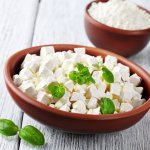dpappas87
Active member
Whenever I buy feta cheese from different places, it tastes slightly different. Does anyone know why? I know that there are specific rules for creating feta cheese, so what is responsible for his differential in flavor and texture?
Is it possible that a place (for example a restaurant) may not actually be buying "Greek" feta? Meaning, could it be a situation where they aren't following the rules and are making a feta-like cheese using different milks, etc? Perhaps it isn't from Greece?
I truly only like Greek feta as far as I know. How can the other places call it feta if they're not following the rules?

Is it possible that a place (for example a restaurant) may not actually be buying "Greek" feta? Meaning, could it be a situation where they aren't following the rules and are making a feta-like cheese using different milks, etc? Perhaps it isn't from Greece?
I truly only like Greek feta as far as I know. How can the other places call it feta if they're not following the rules?



